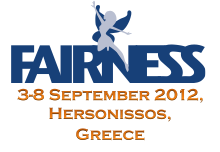Sprecher
Michael Deveaux
(Goethe University Frankfurt)
Beschreibung
The Compressed Baryonic Matter Experiment (CBM) will explore the phase diagram of hadronic matter in the regime of highest baryon densities. Nuclear fireballs created in heavy ion collisions of 8-45 AGeV beam energy will be studied with numerous probes, among them open charm and light vector mesons.
Reconstructing those rare probes requires a vacuum compatible micro vertex detector (MVD) with unprecedented properties. Its sensor technology has to feature a spatial resolution of <5μm, a radiation tolerance of >10e13 n/cm² and a time resolution of few 10 μs. The detector station must combine an active cooling of the sensors
(~1W/cm²) with a material budget below few 0.1% radiation length.
To match those requirements, we rely on the CMOS Monolithic Active Pixel Sensors provided by the IPHC Strasbourg. The highly granular and 50μm thin sensors will be mounted on a cooling support made from CVD diamond. The readout of the sensors will be done by means of ultra-thin flex print cables. We discuss the concept of the CBM MVD and report about the status of sensor R&D and our prototyping
Autor
Michael Deveaux
(Goethe University Frankfurt)

